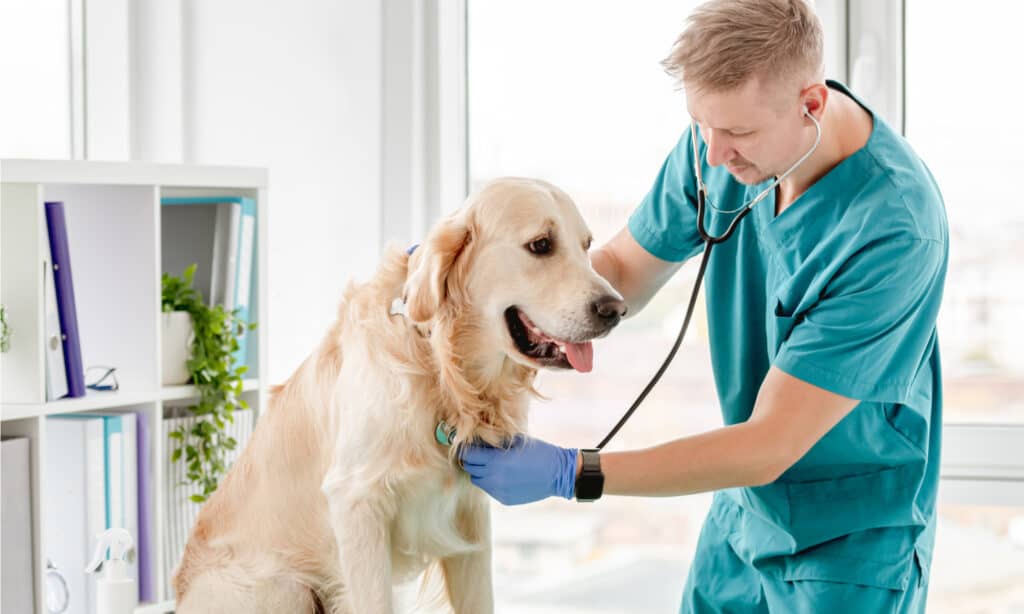If you plan to adopt a golden retriever of your own, then you will need to learn how to keep them healthy and happy as the years go by. Let’s discuss the most common health issues seen in the golden retriever breed, as well as how to spot these complications as they develop!
Let’s get started.
Meet The Lovable Golden Retriever!

Golden retrievers are popular pets because they are loyal, kind-natured, and loyal.
©Joop Snijder Photography/Shutterstock.com
Golden retrievers are one of the most popular dog breeds in the world for a variety of reasons. They are friendly, outgoing, and loyal, making them an incredible companion to add to any family. Though they were initially bred to be a well-rounded hunting dog, these pups have become one of the most well-known family dogs around!
Not only is the golden retriever a wonderful addition to any family, but they are great candidates for a number of important working roles. Golden retrievers are often used in service dog roles, search and rescue operations, and even as police K9s. There is no dog quite like the golden retriever!
6 Common Golden Retriever Health Problems

The average lifespan of the golden retriever is 10 to 12 years.
©iStock.com/kellyvandellen
Most golden retrievers will live and long and happy life of anywhere from 10 to 12 years, but there are a few health conditions they are more prone to developing throughout their life. Let’s break them down in detail below!
#1 Skin Allergies
Golden retrievers are known to experience allergies, especially those that impact the skin. Seasonal allergies to plant material are most common in the golden, but these pups can develop sensitives to anything in the world around them.
Some of the most common signs of allergies in golden retrievers include skin redness, constant itching, excessive shedding, patches of fur loss, dry skin, skin sores, foul or yeast skin odor, and chronic ear infections. We suggest reaching out to your vet if your golden retriever is experiencing allergy symptoms, as there are a variety of ways to manage their allergies long term.
#2 Ear Infections
The golden retriever is prone to developing ear infections due to their skin allergies and fluffy ears. Skin allergies lead to chronic skin inflammation that encourages the growth of bacteria, and the fur in their ears can trap excessive wax and debris. With these factors combined, many goldens suffer from chronic ear infections.
Some of the most common signs of an ear infection in golden retrievers include frequent head shaking, ear odor, red ears, crusting around the ears, pawing at the ears, pain when the ears are touched, and rubbing their face on the ground. We suggest having your golden assessed by a vet if you think they have an ear infection, as these infections are incredibly painful.
#3 Joint Disease
Golden retrievers have an increased risk of developing painful joint disease like elbow dysplasia, hip dysplasia, and arthritis. It’s estimated that 19% of all golden retrievers have hip dysplasia, so it’s important to be aware of this possibility in your pup. While these conditions cannot always be prevented, you can protect their joints by keeping your golden retriever at a healthy weight, offering them plenty of daily exercise, and feeding them a diet that is appropriate for their life stage.
Some of the potential signs of joint disease in golden retrievers include stiff joints, difficulty getting up and down, and limping. They may also show disinterest in physical activity, muscle wasting in the back end, a change in their normal gait, and swollen joints.
#4 Hypothyroidism
Goldens are prone to developing a condition known as hypothyroidism, and this occurs when the thyroid is not producing an adequate amount of thyroid hormones. Thyroid hormones are responsible for regulating tasks like metabolism and temperature control, so an inactive thyroid can lead to many health complications for our golden retriever friends.
Some of the most common signs of hypothyroidism in golden retrievers include weight gain, lethargy, changes in appetite, exercise intolerance, and thinning of the coat. Hypothyroidism is easy to manage with medication, so it’s important to take your dog to the vet for a diagnosis if they develop any of these symptoms.
#5 Eye Conditions
Golden retrievers are prone to developing eye conditions such as cataracts, glaucoma, progressive retinal atrophy, and pigmentary uveitis. These eye conditions can lead to everything from eye pain to changes in vision, often worsening as the condition progresses. Early detection of these conditions are essential for preserving as much of your dog’s eyesight as possible.
Some of the most common signs of an eye conditions in golden retrievers include red eyes, eye swelling, eye discharge, crusting around the eyes, pawing at the eyes, eye cloudiness, and any change in eye appearance.
#6 Cancer
Unfortunately, the golden retriever is the dog breed that is most prone to developing cancer. The golden retriever’s cancer rate is more than double that of other dog breeds, proving just how important it is to on the lookout for any decline in health. Hemangiosarcoma and lymphoma are the cancer types that are seen most often in golden retrievers, but they can suffer from cancer in any form.
Some of the most common signs of cancer in golden retrievers include changes in appetite, weight loss, lethargy, GI upset, swollen lymph nodes, weakness, and coughing. However, cancer can cause a variety of symptoms, so it’s best to have your little one assessed by a vet if they experience any form of health decline.
How To Promote Health In Your Golden Retriever

It’s important to keep up with your golden retriever’s annual vet care to spot any underlying medical conditions.
©Tatyana Vyc/Shutterstock.com
Now that you are aware of the most common health conditions seen in golden retrievers, it’s time to discuss some of the most effective ways to promote their health and wellness!
Choose reputable breeders: Many of the medical conditions we listed above are hereditary by nature. This means that they have been passed down from dog to dog, and this can happen with irresponsible breeding. A reputable and ethical breeder will screen their breeding dogs for common health issues of the breed, helping to ensure that they are not contributing to the prevalence of the medical condition in the breed. When purchasing a golden retriever from a breeder, we suggest seeing each breeding parent in person, asking to see health checks for both the adults and the puppy, and making sure this breeder has a history of pleased customers.
Regular vet care: Regular vet care is not only essential for preventing an array of infectious and life-altering medical conditions, but it is also the most effective way to spot medical conditions in their early stages. We suggest having your golden retriever assessed by a vet at least once a year until they are seven years of age, and then twice a year once they are eight and older.
Balanced & healthy diet: A balanced and heathy diet is essential for promoting ongoing health in your golden retriever. Just as a healthy diet is best for our overall wellness, our canine companions are no different. You should always make sure your golden retriever is eating a food that is made for their age and life stage. You can always reach out to your vet for support if you need help with choosing the best dog food for your golden retriever.
Daily exercise: Daily exercise is a wonderful way to support your golden retriever’s physicals and mental health. A golden retriever that has plenty of daily exercise is less likely to struggle with obesity, behavioral issues, boredom, and medical conditions tied to canine obesity. Golden retrievers should get at least 40 minutes of exercise each day.
Final Thoughts
Most golden retrievers will live a long and happy life at your side, but it’s important to be aware of the medical conditions they can develop over the years. Be sure to review the information we dissed above to better understand your pup’s future health and happiness.
The photo featured at the top of this post is © iStock.com/Eva Blanco
Ready to discover the top 10 cutest dog breeds in the entire world?
How about the fastest dogs, the largest dogs and those that are -- quite frankly -- just the kindest dogs on the planet? Each day, AZ Animals sends out lists just like this to our thousands of email subscribers. And the best part? It's FREE. Join today by entering your email below.
Thank you for reading! Have some feedback for us? Contact the AZ Animals editorial team.







